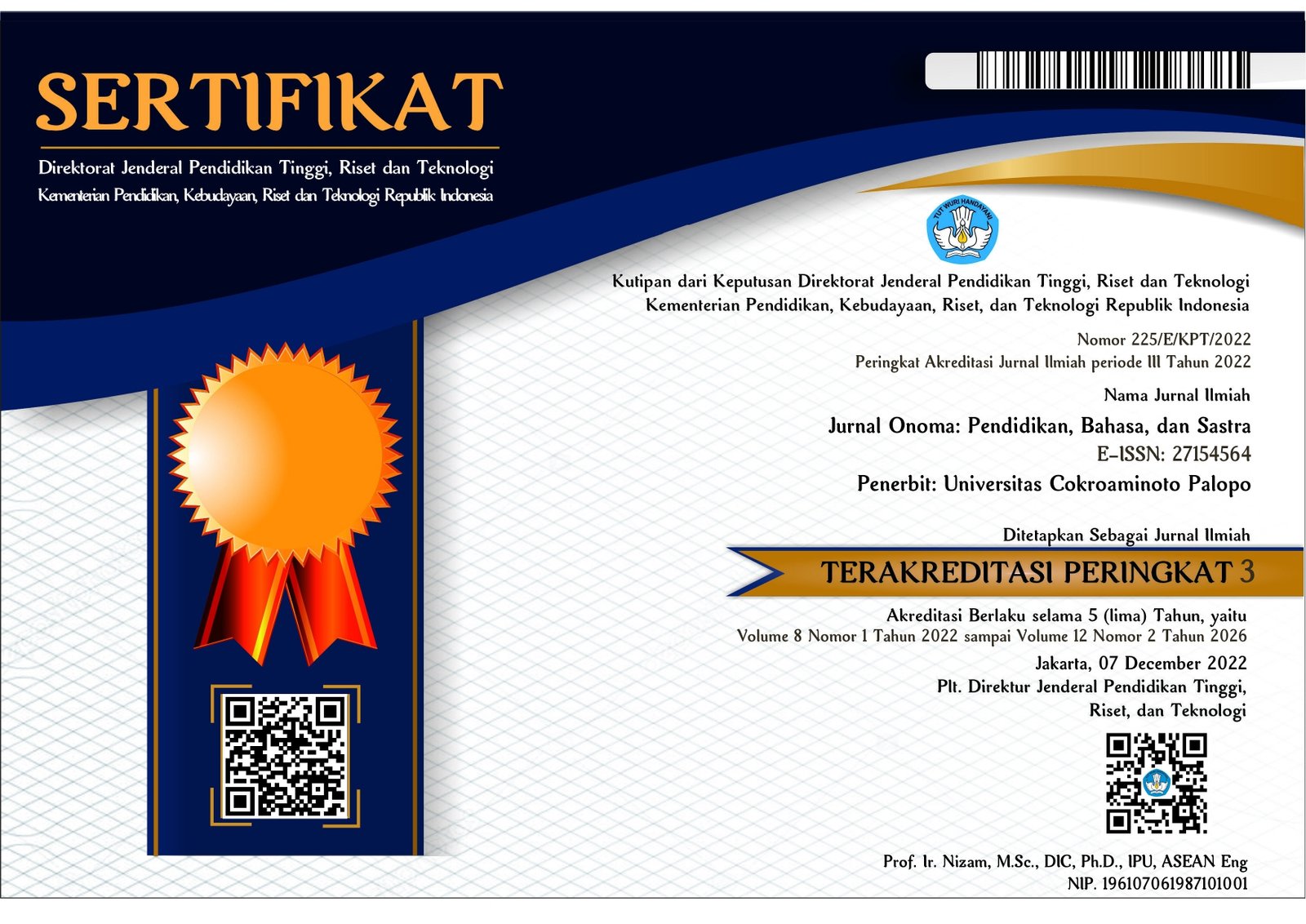Representasi Gender dan Aspek Pendukung Kemampuan Bilingualisme Penutur Bahasa Makassar di Ambon
https://doi.org/10.30605/onoma.v8i2.1977
Keywords:
Gender, Bilingualisme, Sosiolinguistik, Makassar, dan AmbonAbstract
ABSTRAK
Penelitian ini bertujuan untuk mereprsentasikan peran gender dan aspek pendukung kemampuan bilingualisme penutur bahasa Makassar di Ambon. Jenis penelitian ialah penelitian kualitatif dengan menggunakan pendekatan sosiolinguistik. Subjek penelitian ini ialah penutur bahasa Makassar yang tinggal di Ambon. Teknik pengumpulan data dilakukan melalui proses wawancara. Tahap penelitian ini meliputi tahap (1) reduksi, (2) penyajian, dan (3) penarikan kesimpulan. Hasil penelitian ini menjelaskan bahwa gender memiliki peran penting dalam penguasaan bilingualisme penutur bahasa Makassar melalui penggunaan gaya bahasa. Sebagai seorang perempuan, penutur memiliki dominasi dalam keluarganya demi mengenalkan bahasa Makassar kepada suami dan anaknya. Adapun faktor pendukung kemampung bilingualisme penutur tersebut selain dari faktor gender, yakni aspek sosiokultural, sosiolinguistik, dan psikolinguistik.
Downloads
References
Block, D. (2007). Bilingualism: Four Assumptions and Four Responses. Innovation in Language Learning and Teaching, 1(1), 66–82. https://doi.org/10.2167/illt043.0
Fairclough, N. (2010). Critical Discourse Analysis The Critical Study of Language. Routledge.
Fauziah M., S. (2015). Faktor Sosiokultural dalam Pemakaian Bahasa. Zawiyah: Jurnal Pemikiran Islam, 1(1), 154–174.
Khairunnisa, & Sagita, M. (2019). Pengembangan Sosiolinguistik dalam Pengajaran Bahasa ( Secara Teoritis Dan Penerapan) Bagi Mahasiswa Pendidikan Bahasa. Jurnal Sains Riset (JSR), 9(2), 49–57.
Miles, M. B. & A. Huberman, Michael. (2014). Analisis Data Kualitatif: Buku Sumber Tentang Metode-Metode Baru. Universitas Indonesia.
Natsir, N. (2017). Hubungan Psikolinguistik dalam Pemerolehan dan Pembelajaran Bahasa. Retorika: Jurnal Bahasa, Sastra, dan Pengajarannya, 20–29(1), 10.
Pranowo. (2014). Teori Belajar Bahasa. Pustaka Belajar.
Rohman, M. (2017). Internalisasi Nilai-Nilai Sosio-Kultural Berbasis Etno-Religi Di Man Yogyakarta Iii. 12(1), 26.
Sabarua, J. O. (2022). Psikolinguistik Dalam Pendidikan (Sebuah Kajian dalam Pembelajaran Bahasa Indonesia). Artikel Online, 1–12.
Saleh, H. (2017). Bahasa dan Gender dalam Keragaman Pemahaman. Eduvision.
Spolsky, B. (2015). .Pengantar Kajian Bahasa Sosiolinguistik. Terjemahan Hairus Salikin. Jogja Bangkit Publisher.
Spradley, J. P. (2007). Metode Etnografi. Tiara Wacana.
Suciartini, N. N. A. (2017). Analisis Wacana Kritis “Semua Karena Ahok”Program Mata Najwa Metro TV. Aksara. 29 (2):267-282., 29(2), 267–282.
Sugiyono. (2013). Metode Penelitian Pendidikan: Pendekatan Kuantitatif, Kualitatif, dan R&D. Alfabeta.
Wibowo, P. A. W. (2012). Bahasa dan Gender. LITE: Jurnal Bahasa,Sastra, Dan Budaya., 8(1), 5–23.
Downloads
Published
How to Cite
License
In submitting the manuscript to the journal, the authors certify that:
- They are authorized by their co-authors to enter into these arrangements.
- The work described has not been formally published before, except in the form of an abstract or as part of a published lecture, review, thesis, or overlay journal.
- That it is not under consideration for publication elsewhere,
- That its publication has been approved by all the author(s) and by the responsible authorities – tacitly or explicitly – of the institutes where the work has been carried out.
- They secure the right to reproduce any material that has already been published or copyrighted elsewhere.
- They agree to the following license and copyright agreement.
License and Copyright Agreement
Authors who publish with Onoma Journal: Education, Languages??, and Literature agree to the following terms:
- Authors retain copyright and grant the journal right of first publication with the work simultaneously licensed under Creative Commons Attribution License (CC BY 4.0) that allows others to share the work with an acknowledgment of the work's authorship and initial publication in this journal.
- Authors are able to enter into separate, additional contractual arrangements for the non-exclusive distribution of the journal's published version of the work (e.g., post it to an institutional repository or publish it in a book), with an acknowledgment of its initial publication in this journal.
- Authors are permitted and encouraged to post their work online (e.g., in institutional repositories or on their website) prior to and during the submission process, as it can lead to productive exchanges, as well as earlier and greater citation of published work.

















